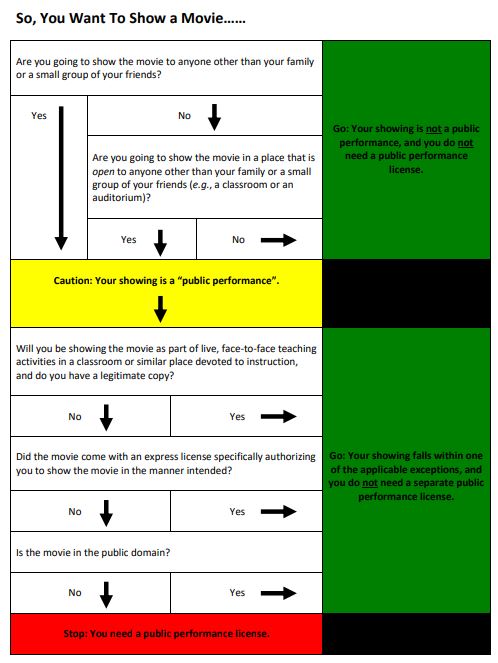| Policy Title | Copyright Guidelines for Showing Movies and Other Audiovisual Works |
| Type or category of Policy: | |
| Approval Authority: | |
| Responsible Executive: | |
| Responsible Office: | |
| Owner Contact: | |
| Reviewed By: | |
| Reviewed Date: | |
| Last Revised and Effective Date of Revision: |
(Adapted for Siena College with permission of Washington and Lee University and the author/creator, Steven McDonald, General Counsel for the Rhode Island School of Design)
When you buy, rent, or borrow a DVD or videotape of a movie (or any other audiovisual work) made by someone else, you normally obtain only the copy, and not the underlying copyright rights to the movie. You certainly are free to watch the movie yourself, but, beyond that, your rights are very limited by law. In particular, you do not have the right to show the movie to "the public." In most cases, doing that requires a separate "public performance" license from the copyright owner. To determine whether you need such a license, you must determine whether what you want to do would constitute a "public performance", and, if so, whether there are any exceptions that would allow you to proceed legally without a license.
First, is it a "public performance"?
The showing of a movie will be considered to be a "public performance" if either of the following is true:
- You will be showing the movie to people other than members of your family or a small group of your friends.
- You will be showing the movie in a place that is open to people other than members of your family or a small group of your friends (for example, a classroom or Key Auditorium/Roger Bacon 202), whether or not any such people attend.
(Generally speaking, then, showing a movie in your home, residence hall room or townhouse will not constitute a public performance, as long as you limit attendance to family and friends. Most other showings will constitute public performances.)
If so, is there an applicable exception to the license requirement?
Even if your proposed showing will constitute a "public performance", you still will not need to obtain a license if any of the following is true:
- You will be showing the movie in the course of "face-to-face teaching activities" (that is, not through Digication or other forms of electronic transmission) that will take place in a classroom or similar place devoted to instruction (that is, not in an auditorium or other public venue, unless it is being used for, and restricted to participants in, the teaching activities), and you have a legitimate copy of the movie (which, in general, does not include one that you have videotaped yourself from a broadcast).
- Your copy of the movie came with an express license authorizing the particular manner of showing. (For example, some educational movies, such as those purchased directly from California Newsreel at the "institutional" price, come with licenses to show the movies for certain noncommercial institutional purposes.)
- The movie you wish to show is in the "public domain." (Determining whether a particular movie is in the public domain can be difficult, and even movies that are quite old can still be protected by copyright. The Public Domain Movie Database publishes a list of movies it believes to be in the public domain, but it is neither complete nor authoritative.)
Note, however, that there is no general "educational," "nonprofit," or "free of charge" exception. Even a showing that is all three of those things will require a license if it constitutes a "public performance" and does not fall within one of the exceptions listed above. Thus, most showings outside of the class context will require licenses.
If you do need a "public performance" license, you can obtain one in one of the following ways:
- By renting the movie directly from a distributor that is authorized to grant such licenses, such as Swank Motion Pictures, Inc., rather than from a video store.
- By contacting the copyright holder (generally the studio) directly.
In most cases, you will be eligible for a "non-theatrical" public performance license, which is considerably cheaper than what a commercial cinema must pay. Still, the cost is likely to be at least several hundred dollars, especially for the most recent movies. That may seem unreasonable, but keep in mind that inability or unwillingness to pay is not a valid defense to a copyright infringement lawsuit. Student organizations showing films for entertainment are responsible for paying royalties.
If you have any questions about movie licenses or about copyright law generally, please contact the Office of College Counsel at (518) 782-6783 or refer to Siena’s Policy on Copyright Usage and Compliance. The Standish Library (copyright-help@siena.edu) will collaborate with the Office of Counsel (Copyright Officer) in responding to comments and specific questions about the Policy.
Draft. October 11, 2018 Student Life Compliance
